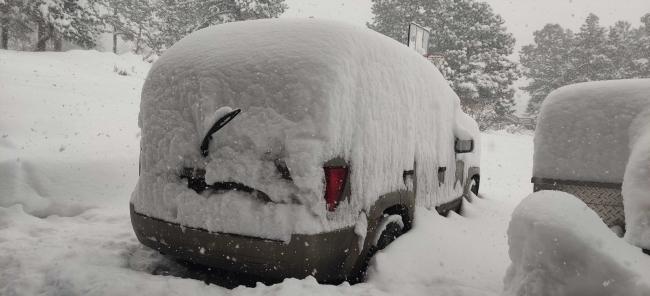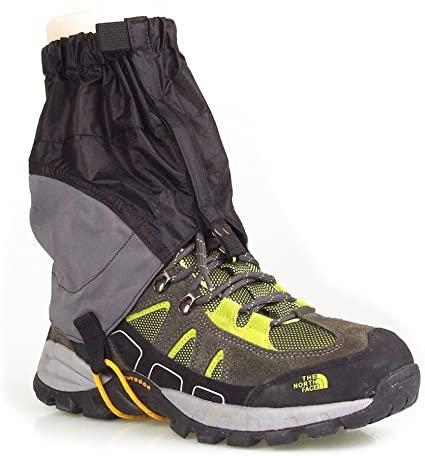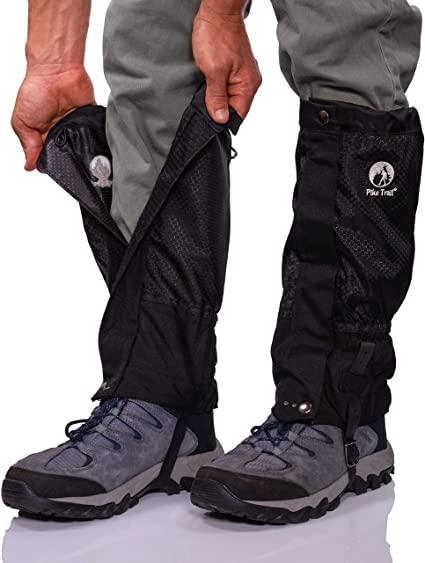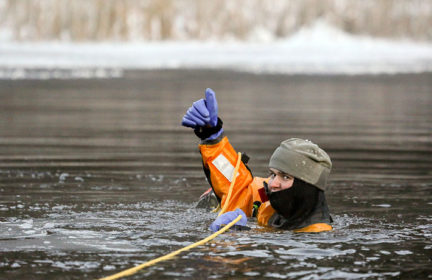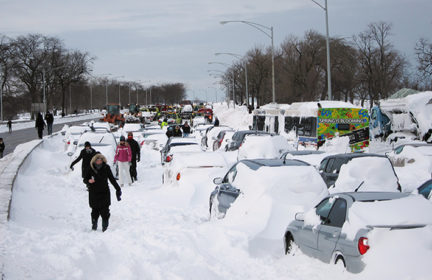Do you have any winter clothing recommendations?
Colorado got dumped on this weekend. The above picture is what we got over night and are expecting about 7-8 more inches today.
I spent an hour out there and came in soaked! I learned that my leather hiking boots need another layer of Otter Wax to waterproof them further, my Carhartt jacket just soaks in all the snow and is not water resistant at all, and my cheap-o ski gloves must have lost all of their factory DWR coating.
This could be VERY dangerous if I had to bug out and relied on these clothes, so I’m grateful that I could learn this lesson now when times are good.
What winter clothing recommendations do you have? Boots, coat, gloves (especially gloves), pants, hat, etc…
Other things I learned:
- I had learned somewhere that applying car wax to your shovel will make it slick and prevent snow and ice buildup in the scoop. This is something I’ll be doing as soon as things melt down, because I had to keep chipping away built up snow inside the shovel scoop and it was very inefficient.
- I’m also going to buy 1-2 more shovels as a backup. If my shovel were to break right now, I would be out of luck and it would be very difficult to dig out my car without one.
- Put your wiper blades up to prevent them from icing to the windshield
- Put gallon zipper bags on the side view mirrors. You just slip them off, don’t have any ice buildup and don’t have to scrape them risking damaging the little motor behind the glass.
- I have a large push broom that I use to brush off my car. I wrap it in a microfiber towel to prevent the plastic bristles from scratching the paint. I can clean a car in like 3 swipes compared to the little handheld brush that I keep in my car which would take forever.
-Be Prepared-
-
Comments (12)
-
Bill Masen - March 14, 2021
Most of my gear is from brands unheard of in the US so it would be pointless listing the brands, but I do buy clothing and gear designed for Alpine and Nordic environments its designed for activity in snowy winter climates. the only US brand I know is CANADA GOOSE.
I do prefer the multi layer method of dressing rather that just a thick topcoat, so its Merino wool long sleeved vest under a Microfleece top over a waterproof microfleece outer jacket.
Footwear wise my stuff is all Gortex lined but I also top then with waterproof gaiters.
-
Robert LarsonContributor - March 15, 2021
Some gaitors would be smart to have. Thanks for the recommendation on those! Nothing is worse than having some snow go down your sock.
… ok, maybe it’s worse when the wife puts a snowball down your shirt. Guess that’s why they invented scarfs.
-Be Prepared-
-
-
Bob - March 14, 2021
Priority goes to socks, gloves (mittens) and hat(s). Other stuff is easier and less time-consuming to work on, at least in my experience.
The tangent to above: some like moisture-absorbing sock liners, some just 1 thick wool sock and 1 thinner wool sock. Obviously much time required to ensure boots will accompdate sock arrangement for proper fit (Sidebar: anti-fungal foot powder). Gloves available for various winter environments for various purposes. Will gloves be for a wet winter environment ? Are gloves needed to work with tools ? Are anti-vibration gloves needed (chilly area oil rigs) ? Some folks wear good gloves and also wear aound neck by rawhide (some of the nylon paracords freeze up in chilly places) thong a pair of oversize mittens. If “hat” also requires carrying on person a hard hat; strongly recommend to get an all wool sock “watch cap”. Adjust the hardhat’s rigging while wearing the watch cap. (Snow blindness prevention via googles already on hardhat.)
……
Some folks get into their winter garments AND THEN wear ski pants on top. Sometimes they forget about the tradeoff of mobility and stuff in pockets versus being warmer.
……
I start of with 2 sets … it 2 layers of all wool “long johns” underwear. Used to only wear Jaegar brand from UK but believe company was merged away. The Chinese have a close substitute.
My field jacket has a winter storm hood. Scarves serve as “O” rings. I wear more than 1 of wool. I have the silk stuff but just don’t like silk even with it’s high insulation properties.
……
And don’t forget to open and close a few times the car’s gasoline flap so it’s not frozen solid when going to refuel. Recommend no lubericants on metal stuff. The lubericants freeze up.
-
UbiqueContributor - March 14, 2021
Hi Robert, Hope this doesn’t sound like a Canadian informercial, but we do cold here and this is what I use and pretty much most people who work/live in the extreme cold.
Your timing is good because much of this gear is probably on sale right now with spring around the corner.
Outwear Canada Goose Canada Goose, is bar none best outerwear for extreme -52 Celsius. It isn’t inexpensive, but if you look after your parka, it should last you a very long time.
There is a company in Thunder Bay On, sporting goods store, which was a better buy than anything I could find locally. They were good to deal with and if you want their name, I can look it up.
I wore a skidoo suit in the cold for years because it is one piece and the wind can’t get at you or up your back.
If it’s cold wind, you want a fabric to break that wind and keep it from getting to your body. I bought a thrift store Northern Style Parka and I stil use it on extremely cold days. It doesn’t look heavy duty, but the fabric keeps the cold off me.
Underwear Stanfields Stanfield Underwear
The men’s heritage heavy Henley is absolutely solid warmth. Husband worked on heavy equipment in cold, including mountain work and never cold. He wears this garment still. It is also very easy to care for and washable wool. Just follow instructions. I hang them to dry.
Footwear Baffin Baffin Boots, Kamik Kamik Boots and Sorrel Sorrel Boots
Husband has Baffin Boots for heavy duty wear and Keen for everyday not too cold winter (we are not happy with his Keen’s as the upper blew out a year in and I had to shoo goo them, so he will be getting other brand).
The Baffin are excellent and very warm, as are the Sorrel Boots. I can’t personally speak to the Kamik Boots.
Socks JB Field/Great Sox
Simply the best wool socks ever. Washable and great colors. Their Icelandic sock is so thick and comfy.
Ojbro Vantfabrik Sweden Mittens/Gloves
I sourced the Ojbro gloves for husband who has had hand surgery and damage to his hands from years on heavy equipment. The Ojbro Vantfabrik gloves are manufactured on a small scale by a cottage industry in Sweden. They are very warm gloves and distributed through various links. Very nice people and good product – very warm.
You want to layer your gloves/mitts and there are flip mitts, where the finger part of the mitt flips over so you can use your gloves fingers beneath. It attaches in place with velcro. They are very convenient to have.
Protect your lungs in the cold. If anyone you know has any heart problem, they need to protect their lungs from the cold. There are balaclava’s that we use on snowmobiles or you can wrap you face/mouth area in a good wool scarf.
I have a great Icewool scarf about 18-20″ wide that I use to wrap around my face, neck and upper chest in the cold.
That’s about all I can think of now. I reply back if anything else comes to mind.
Methyl Hydrate – gas line antifreeze put about 1/2 cup in the gas tank to prevent your gas line from freezing. I do this every time I tank up. If you buy the jug of Methyl Hydrate, it is much more economical than those little containers of it that they sell at gas bars.
Water, Food, Hand/Foot Warmers, Lighters, Candles, Blankets. If you’re in a jam, and all else fails, burn the spare tire to survive. Stay safe.
-
Robert LarsonContributor - March 15, 2021
So many great links! Thank you for taking the time to share them all. I do need to invest more into my winter wardrobe.
-Be Prepared-
-
-
AT - March 14, 2021
We no longer live somewhere that gets cold, but when we did, clothing was always a work in progress. Winter for us in Eastern Oregon (~4000 feet) was snow on the ground for 4-5 months and highs in the 20’s F. I tend to be doing things when I’m out in the cold (or else I’d be sitting at home…) and so staying dry from inside and outside is really important.
Before delving into the minutia of my clothing strategy, I think my most valuable piece of advice is that a short-handled scoop shovel is $30 well spent when moving deep snow.
I really like my Muck Boots (Edgewater model). Neoprene upper, rubber lower, decent tread. It’s a warm boot, waterproof, and you don’t need gaiters. They will fit in many snow shoes if you need/want to. The neoprene sides are the weak spot, but cuts/tears are easily patched with glue. I like thin Darned Tough socks and a really thin silk or polypro liner sock. This set up is my go to under maybe 25 degrees and was my around town boot in the winter, though they got really warm in the grocery store. Sorrels don’t fit me well, but I was envious that the liners on most of them come out so you can leave the nasty boot shell outside and bring the liner in to dry.
Gloves have always been a challenge. I go with thin polypro liners, some sort of fleece glove over that, and then a waterproof mitten (no insulation, just waterproof fabric). The mittens can come off for doing small tasks then go back on. Sweat invariably becomes an issue and I manage it by frequently taking the mittens off, letting my gloves breathe some, getting cold, then putting them back on. Never have found a way around it. Layers are key for me.
Outerwear is tough. If I need waterproof when it’s below freezing and I’m being active, I wear softshell fleece jacket and pants. I really don’t like goretex type jackets in the winter/snow for some reason. They don’t breathe enough, tear too easily, and feel too bulky for me. If I was dealing with a downed tree or something very abrasive near home I would wear my carhartt stuff and know that I had a limited time before it soaked through. Puffy coats are generally too warm for me unless I’m sitting still, too delicate, and get wet to easily.
Under all that I usually wear a synthetic stretchy shirt like under armour, then either a polypro or wool shirt. If I wear an insulating later below it’s usually some sort of running/cycling tights. I have had various fancy fleece hats that were never any better than a Carhartt watch cap.
That’s what I do, but in the end it’s trial and error to find what works for you.
-
Robert LarsonContributor - March 15, 2021
I think that is where I’m lacking, layers. Could you share some links or pictures of your glove setup?
What does the polypro liner do and look like? Where do you buy waterproof thin mittens?
-Be Prepared-
-
AT - March 15, 2021
Layering is definitely the key for me. I would gauge the weather and what I was doing, how long I would be out etc and then head to the closet and start grabbing things.
The keyword for the mittens seems to be “shell mittens.” Mine are Outdoor Research from a long time ago. I can’t find them now. Not goretex, just treated nylon. Still waterproof. All that stuff is buried in a closet but if I were to buy it all again I might get these things from REI:
- https://www.rei.com/product/136791/rei-co-op-liner-gloves
- https://www.rei.com/product/136764/rei-co-op-fleece-gloves-mens
- https://www.rei.com/product/136770/rei-co-op-minimalist-gtx-mittens
- This may be the current version of my mittens: https://www.outdoorresearch.com/us/revel-shell-mitts-271551
Not a specific endorsement for REI, but it’s easy and gives the general idea. It’s not cheap but in the end costs about as much as single pair of fancy gloves but is more versatile.
The liners are just thin gloves that wick moisture away. I think my are polypropylene and most are some polyester variant or wool. Fleece gloves can get a little damp. The liners are built to move moisture out and keep your skin relatively dry. I was out one sunny day when it was around 15F and my hands were getting damp. I took the mittens and fleece gloves off and could see tiny drops of moisture coming out and freezing in a little coating on the liners. Then of course I basically had frost on my glove which wasn’t helpful but it looked cool.
-
Bob - March 16, 2021
AT, Appreciated reading the fleece gloves’ ad mentioning “touch screen compatable fingers”. This has been a BIG “issue” since the world wars and rifle trigger housing guards to our current “Panasonic Tough Pad Note Book”. Too many of the best field folks say they’re not taking off the gloves to operate a field computer. Now we’re finally getting gloves that work.
There is no gortex in this place.
-
Robert LarsonContributor - March 16, 2021
Hey! Thanks a lot for the links. That makes so much sense now. I’ll know what to look for when I go to the store.
I’m definitely going to do this strategy, but I’m thinking about timing. I wonder when they will discount their items enough because of the end of season, but not wait too long where they are sold out. I’ll have to just call the store and ask.
Again, thanks!
-
-
Pops - March 18, 2021
Great links, thanks everyone.
I did outside work on a dairy for some years. It doesn’t get super cold in the Ozarks but it can get -10 and too often you get wet. A few of my favorite things:
Layers! Coats are great when I’m standing around and it is super cold but if I’m working I just want a shell and lots of layers so I can shed and add back without getting sweat wet.
As much synthetic as I can stand.
Neoprene dive gloves! Or convertibles like these
neoprene Muck Boots (high top Chore Boot)
Forget the fancy goreTex, in my experience you might as well wear a cheap rain-suit as a $300 high tech jacket because they both trap sweat if you are sweating. Better yet, wear a poncho.
-
Alicia - March 29, 2021
I agree with the others – Layers is the key. I lived in Rochester, NY when they had record snow and cold and was surprised how much you adapt to consistently cold temperatures. I’ve more recently embraced ultra-fine merino wool. I get the itches from most wools, and have learned that it really does pay to get quality here: Icebreaker, Smartwool, and others just check for ultra-fine. I’ve done jackets/coats like AT’s mitten layers. Different insulating layers including vests, jackets, sweaters that depend on the activities you’re doing. But nearly always with a waterproof/windproof shell for snow that becomes water as soon as you’re inside somewhere warmer (car, building). I also love a pair of fully leather palm windproof fleece gloves that I still have that served me to about 5 degrees before needing to up to true winter gloves.
-
- Mylar Bags - 4 days ago
- Shot Show 2026 recap - 1 month ago
- News for the Week 2026-1-12 - 2 months ago
- News for the Week 2026-01-05 - 2 months ago
- News for the Week 2025-12-29 - 2 months ago
This forum is heavily moderated to keep things valuable to as many people as possible. Full community policies are here. The basics:
- 1. Be nice to each other.
- 2. Stay focused on prepping.
- 3. Avoid politics, religion, and other arguments.
- 4. No unfounded conspiracies, fake news, etc.
- 5. Debate ideas, not people.
